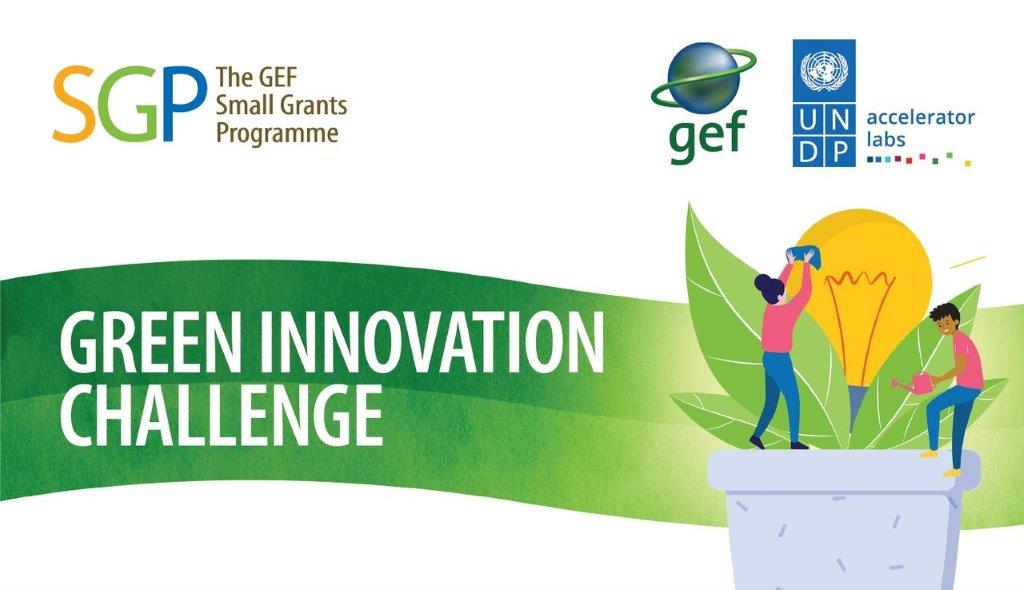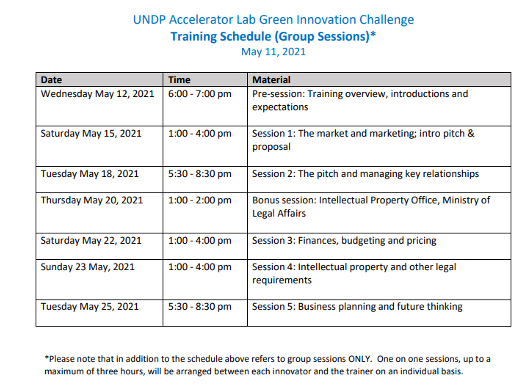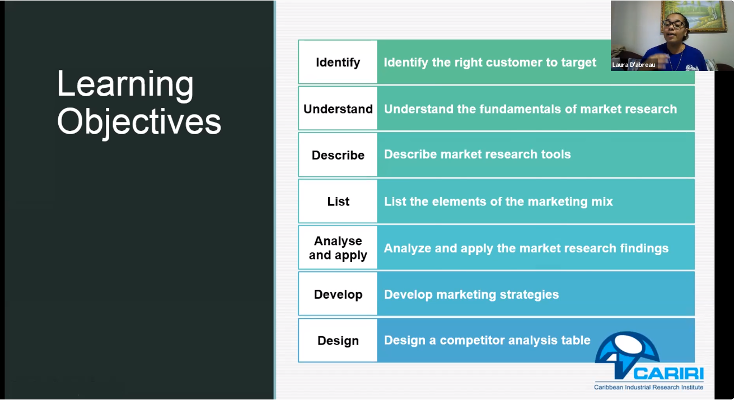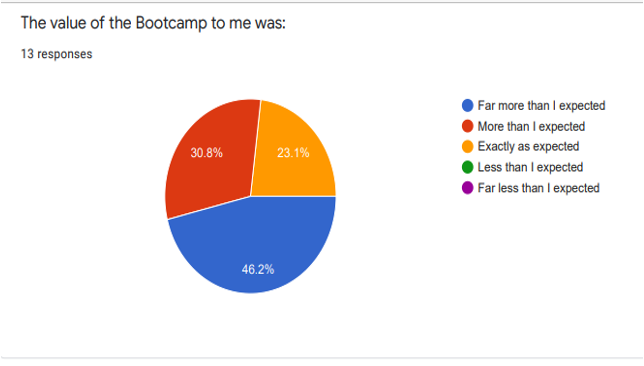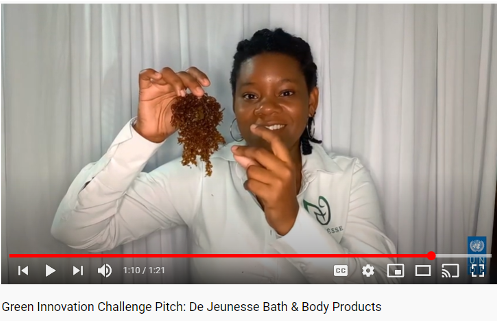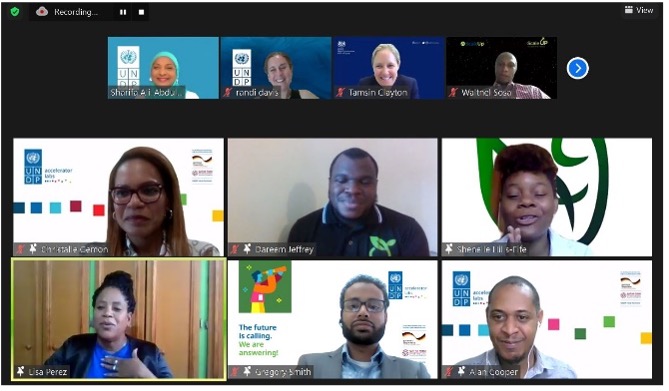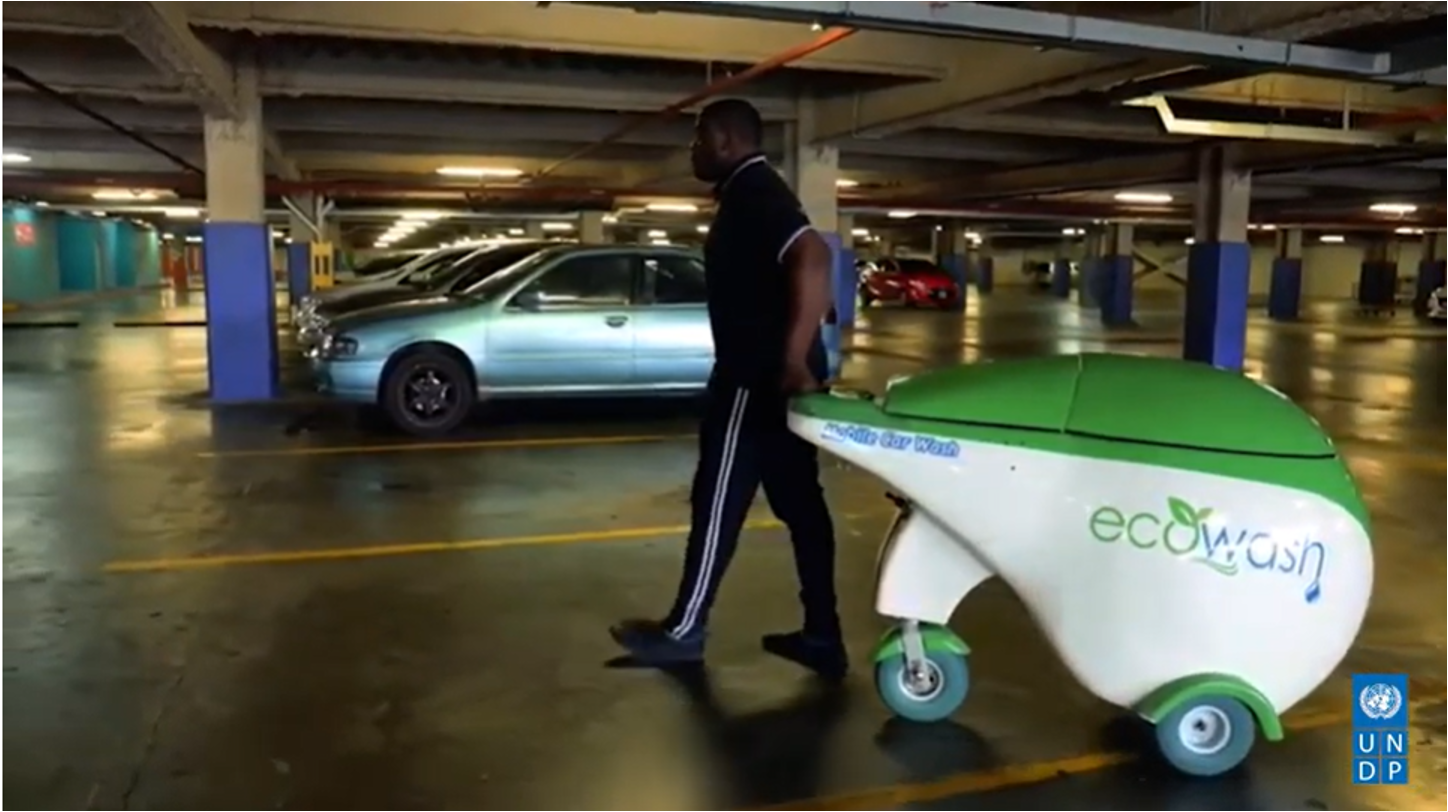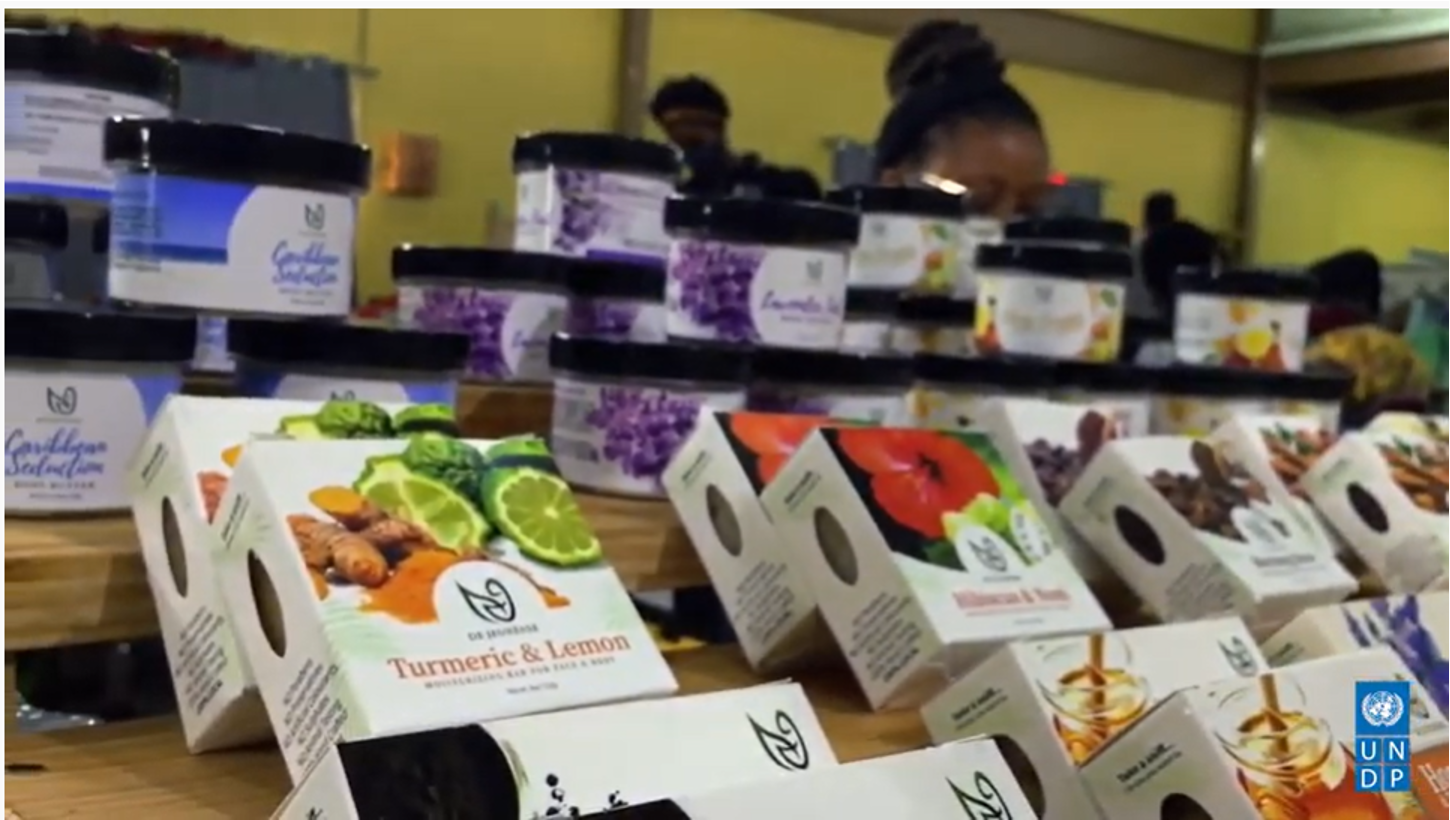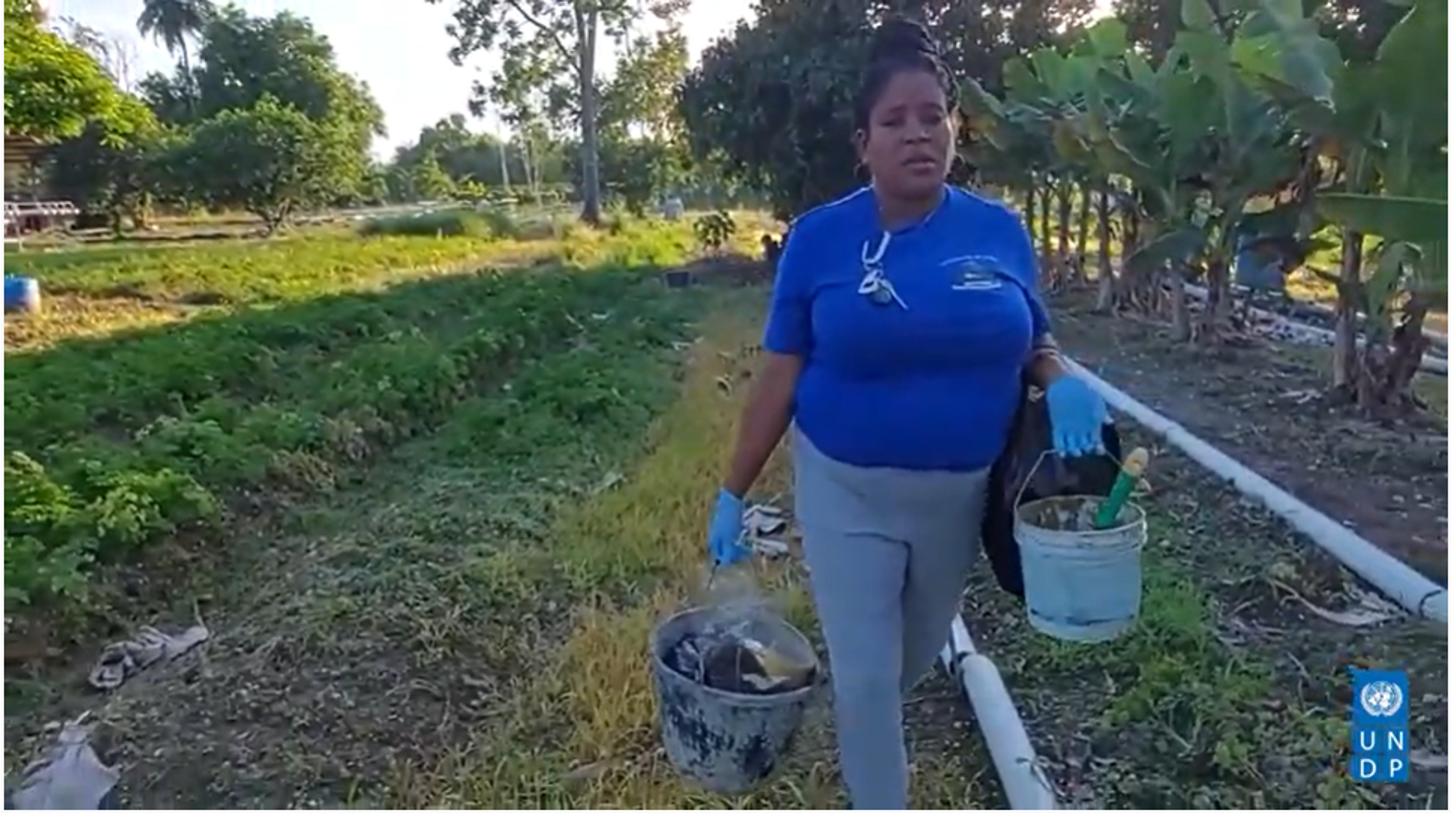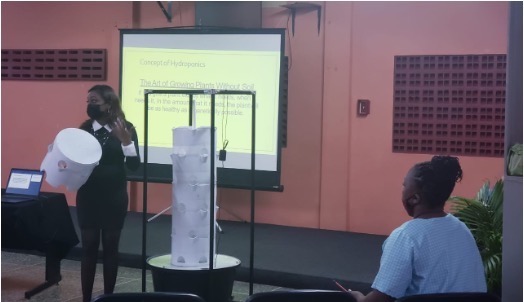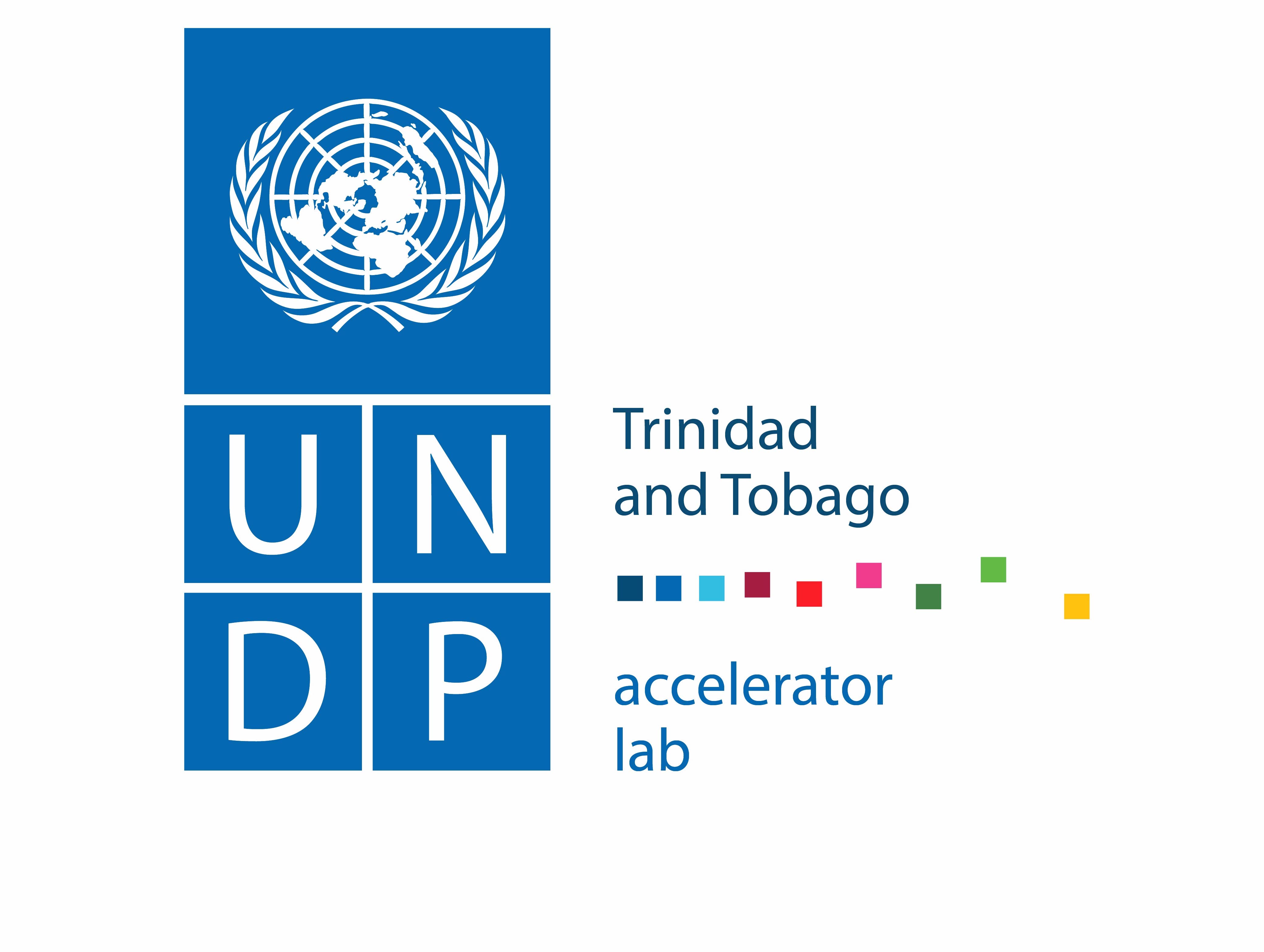The UNDP Trinidad and Tobago Accelerator Lab serving Aruba, Curacao, Sint Maarten, Guyana and Suriname, held the Finals of its Green Innovation Challenge on Thursday 24 June 2021. Launched in March 2021, the Challenge was designed to identify grassroots innovations that promote and enhance micro-entrepreneurship in the green economy. The response to the Challenge was overwhelming as it attracted over 100 applicants from various fields, walks of life and demographics.
Using a pre-determined scoring methodology, the applications were evaluated and a shortlist of 15 semi-finalists comprising 54% female (8) and 46% male (7), emerged. Projects included innovations in agriculture, energy, water conservation, recycling, upcycling and bio-diversity. The 15 semi-finalists were invited to participate in the challenge through two key phases; the “Boot Camp” and the “Shark Tank”. First, in the Boot Camp, participants received coaching to develop and submit detailed written proposals, the top five of which were selected using a set of pre-determined criteria. The top five were then invited to pitch their innovative ideas to a live panel of judges at the virtual Shark Tank styled competitive event.
The Capacity Building Boot Camp
As part of the Green Innovation Challenge methodology, the cohort of 15 semi-finalists engaged in a two-week intensive Boot Camp where they received training and coaching to help them develop their proposals and prepare them to pitch live before a panel of judges. But why put the semi-finalists through a Boot-Camp? What manner of twisted Labbers would put already nervous semi-finalists through two weeks of intense training? And in the end, was it worth it? ABSOLUTELY!
Here’s the rationale- the 15 semi-finalists would be narrowed down to the top five based on an evaluation of proposals to be submitted four weeks after making it to the semi-finals. However, it was apparent that the top 15 were at varying skill levels with respect to proposal development, pitching ideas, and even speaking about themselves and their innovations. In order to level the playing field and to build the capacity of the group as a whole, the Lab decided to enroll the vast experience of the Caribbean Industrial Research Institute (CARIRI) to work with the finalists as a group.
Owned by the Government of the Republic of Trinidad and Tobago, CARIRI was established in 1970 with the technical and financial assistance from the United Nations Development Programme (UNDP) and United Nations Industrial Development Organization (UNIDO). The organization focuses on R&D in various fields and supports the training of MSMEs.
The Lab worked with CARIRI to develop a blended curriculum of both traditional and non-traditional areas of focus including:
i. Capacity building workshops in areas of need identified by participants (finanical management, marketing etc.)
ii. Capacity building workshops in areas of need identified by the Lab (intellectual property, furtues thinking)
iii. One on one individual sessions to work on proposals.
iv. One on one individual sessions to work on promotional videos and preparation for the final event.
At the end of the Bootcamp the following outcomes were expected:
- Submission of 15 propsoals based on the ideas submitted for the challenge (these proposals would be evaluated to choose the top five finalisists).
- Submission of 15 promotional videos, one on each submission to be used as a supplement to the proposals.
At the end of the Boot Camp, the feedback from participants was overwhelmingly positive as they indicated that they gained much more than expected from the overall experience. Specifically, over 46% of respondents expressed that the value of the Boot Camp was far more than they expected, and over 30% felt that it was more than they expected for a total of over 76% positive feedback. During a post-mortem of the Boot Camp between the Lab and participants, they expressed that as micro-entrepreneurs, they are often left out of opportunities for training and grants as they fall outside of the NGO category. They expressed that the Boot Camp addressed gaps that existed for them, and felt that such a programme should be made available to a wider cross-section of micro-entrepreneurs in Trinidad and Tobago.
[Click here for full participant feedback from the Boot Camp].
From the Lab’s perspective, the results of the Boot Camp also far exceeded expectations. The Lab received 15 top-class proposals which could compete with documents developed by seasoned professionals. The 15 videos were professionally made and well executed by the participants. The videos and proposals together showed the immense growth of the participants over the duration of the Boot Camp and engagement with CARIRI. Out of these proposals, the top five were chosen using a set of pre-determined criteria. However, the high quality of the submissions made the selection challenging for the evaluators! The top five were then invited to pitch their innovative ideas at a virtual “Shark Tank” style event.
[Click here for link to the Top 15 Videos]
The Final "Shark Tank" Event
During an exciting two hours at the final “Shark Tank” style event, the five finalists pitched their innovative solutions to an international panel of judges comprised of senior development leaders, diplomats, and start-up investors.. The panel of judges was specifically chosen to represent a mix of donors, decision makers at the governmental level and innovative thinkers. This led to an interesting, engaging and dynamic event.
Each finalist was introduced with their promotional video then had four minutes to pitch their idea to the judges who then had four minutes to conduct a Q&A. In the end, three winners emerged, in no particular order: De Jeunesse Bath and Beauty Products - converting sargassum seaweed into beauty products; Ecowash- waterless and portable car wash systems; and La Creacion de Dios- converting waste from fish markets into fertilizers and fish feed.
Click on the images below to see each video.
The runners up were Solarponix- using a combination of solar power and hydroponics to produce portable automated home gardens, and Rainforest Agricultural Consultancy- using indoor hydroponic greenhouse techniques to empower female inmates through argi-entrepreneurship. The judges were so impressed by the quality of all submissions that a decision was made for UNDP to develop projects with the runners up as well. In addition, there was a ‘People’s Choice’ segment where viewers had the opportunity to vote for a winner from the remaining 10 semi-finalists. This spot went to My Beach, My Water, whose innovation involved converting recycled tyres into flip flops and beach wear.
The winners will now continue their exciting journey with the UNDP. This will include receiving financial support to build prototypes and mentorship to enhance business skills. The aim is that these products and services will contribute meaningfully to the UN Sustainable Development Goals while enhancing employment opportunities for many.
Creating an enabling environment through strategic partnerships
From a global perspective, the Innovation Challenge in Trinidad and Tobago was unique and different from previous applications of this modality within the UNDP framework due to three defining features; groundbreaking inter-agency partnerships, an integrated capacity building bootcamp, and a focus on social entrepreneurship that is unique within the local context.
Partnerships:
o The Lab partnered with the Global Environment Facility’s Small Grants Programme to jointly host this challenge. Globally, this is the first time that the GEF SGP and the Accelerator Lab have collaborated to deliver support to the green innovation community.
Capacity Building Bootcamp
o The Lab partnered with the Caribbean Industrial Research Institute (CARIRI) to provide the Micro and Small Entrepreneurs who participated in our challenge with critical and tailored one-on-one training to drastically improve their ability to successfully manage sustainable social enterprises.
Focus on Social Entrepreneurship
o The current support provided by government and International Organizations to the local community is limited to non-profits and community service organizations. Social Entrepreneurs, who help to improve the environment and community in a self-sustaining delivery format, have been consistently overlooked until now. This challenge targeted that specific group and provided support and services that they never previously had access to.
Looking forward
Some concrete next steps have been identified emanating from the Green Innovation Challenge:
- The GIC Methodology is now being explored by other programme teams within UNDP as it has proven successful in identifying untapped solutions that have the potential to make a significant impact.
- Green Ecosystem Map- this has been created to map all stakeholders in the green-economy. The aim is to facilitate partnerships, access and collaboration at the touch of a button. [click here for a preview of the map].
- Specialized curriculum: The Lab will work with partners to develop a specialized curriculum for micro-entrepreneurs, informed by the gaps and obstacles they encounter from inception. A collective intelligence exercise involving hundreds of entrepreneurs will form the foundation of this beneficiary-driven initiative.
The Green Innovation Challenge was the Lab first contribution to the green economy in Trinidad and Tobago and has set the stage for additional partnerships both internal and external to UNDP. The future is calling, we are answering!
Alan Cooper, Head of Solutions Mapping
Christalle Gemon, Head of Experimentation
Gregory Smith, Head of Exploration

 Locations
Locations